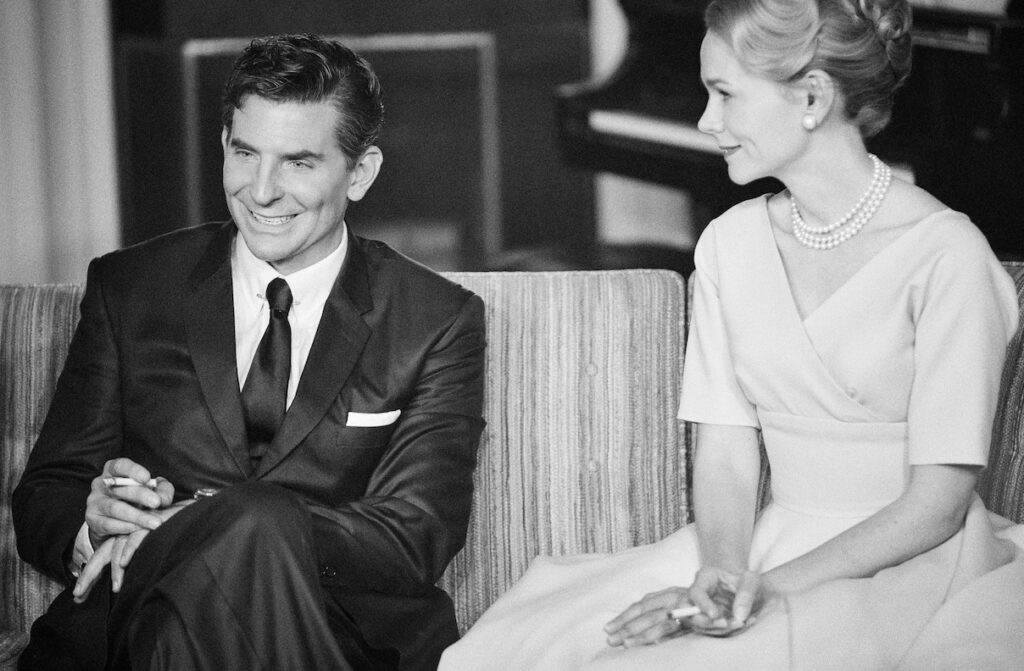
When Bradley Cooper jumped into the director’s chair for the umpteenth remake of A Star is Born, many weren’t sure of what type of film maker he would be. When the film was released however, it was clear that he was a director that had a vision and not just someone who told his crew to point a camera somewhere and hoped for the best. With his second go around as the man at the helm, Cooper has exceeded the expectations as a visionary, but does the entire film knock it out of the park?
Telling the story of America’s premiere conductor and composer Leonard Bernstein has long been a project Hollywood has been itching to tell.
While the project had at times been tied to the likes of Martin Scorsese and Steven Spielberg, it ended up in the hands of Cooper who had at the time already been cast as Bernstein. What originally was intended to be a more traditional biopic, Cooper decided to go a different route which ends up being both a strength and possible weakness.

Visually, Maestro is bloody magnificent. It hits the heights in every aspect of a visual medium. The style and camerawork match the film styles of the time periods they are portraying. The set-design and fluid camera movements are divine, and the more static and still frames are rich with depth and distinction. Barring one very early awkward CGI shot of Carnegie Hall, Maestro demonstrates and delivers a very classic style of film making that has been absent from our movie theaters for some time.
In a year where the rampant fervor over the grandeous scale of Oppenheimer‘s IMAX reels and the visuals they provide or the well defined use of Barbie‘s candy coated colors; Maestro makes them all look like child’s play. When a single frame of a film can evoke as much emotion from the viewer as well as any deeply cathartic story telling, you’ve done things right and should be showered with awards for it. Kudos to the entire team Cooper assembled for this film and balancing all the part to present such a complete vision.

But what isn’t balanced is maybe the parts of the story telling that I liked most, but may upset others.
This is not a traditional biopic. The deep dive into ever facet that lead Bernstein to become the man he was is vacant in this affair. Frankly, I’m sick of the point A to B biopic. So, for me, this is a ray of sunshine. But those he need more detail and exploration into a singular man, will find themselves wanting more.
This is more of a family drama or the portrait of a relationship through its ups and downs, with Bernstein and his wife Felicia Montealegre (Carey Mulligan) and their family as the main characters. Their life is portrayed as it occurred in real life, but their relationship is the movie, not Bernstein’s career. And as this is a positive for me, it also is a bit of a negative as it explores nothing that hasn’t been labored over and over again by other films and the arts. The story isn’t void of substance, but this is certainly a case of style rules. But oh is that style just breathtaking.

Cooper and Mulligan both also have never been better. While I personally feel like Cooper’s vocal performance felt more like the love child of Robert Evans and Bobby Bittman (SCTV fans unite!), his mannerisms, delivery, and portrayal scream perfection while also not being just an impression. Mulligan, while always fantastic in her work, has somehow felt a little over rated in my eyes. But this is the role that overshadows them all.
All of the factors that I loved about Maestro, might be the parts that others dislike. It never hangs long onto any situation. You’re given the pieces of a scenario and instead of lingering too long on a belabored point, the film transitions into the next portion of their life. It moves fast in this respect and some viewers might want to to move a little slower. Either way, there is no denying that while he still has some things to tighten up, Bradley Cooper 100% knows what he is doing with a camera and I am all for it.
Final Grade: B

